
The Hunger Safety Net Program (HSNP) in Kenya provides reliable cash transfers to poor households. These transfers should improve the capacity of beneficiary households to meet immediate, essential needs and to invest in improving future prospects. By increasing access to cash, HSNP may also stimulate the emergence and growth of non-pastoral commercial enterprises, generating employment, income and other “multiplier” gains to residents of the arid and semi-arid lands of northern Kenya.
Project Overview
Lead PI: Christopher Barrett, Cornell University
Partners: UC Davis, Syracuse University, International Livestock Research Institute, Oxfam
Timeline: 2008-2012
Funding: $2,000,000
Region: Arid and semi-arid lands of northern Kenya
Key Innovation: Index-based livestock insurance paired with an asset transfer program
Commodity: Livestock
If access to funds were the only thing holding back poor households, the HSNP should suffice as a policy instrument for sustainable poverty reduction. But given the considerable risk faced by households, theory and empirical evidence both suggest that there may be considerable added value by augmenting HSNP with a Productive Safety Net (PSN) that insures households’ critical assets against catastrophic loss.
Project Summary
Researchers supported by the Feed the Future Innovation Lab for Assets and Market Access are developing a Productive Safety Net (PSN) based on Indexbased livestock insurance (IBLI) to augment Kenya’s HSNP. IBLI is an innovative, proven insurance product that bases payouts on an index of factors that correlate with livestock losses to help pastoralist households affordably manage risk.
The research team is currently analyzing a series of potential indexes that can be used to provide the best possible IBLI in terms for vulnerable populations in Kenya’s northern arid and semi-arid lands. Preliminary discussions with both national insurance and international reinsurance companies have identified significant private sector interest in providing the IBLI for the PSN.
Given that index insurance is novel to the region, the team will also familiarize households with the concept and structure, as well as with the possibilities and risk associated with index insurance. Building on lessons learned from earlier work in Peru, the team will introduce index insurance to voluntary participants through games that realistically simulate the product.
The team will evaluate the impact of both the HSNP and PSN, which will help inform the design of future cash transfer programs and assess the utility of including PSN programs. It will look at standard headcount/poverty gap measures, as well as asset accumulation, child education and health, and income and consumption.
Anticipated Impacts
A PSN should help stem the collapse of vulnerable-but-presently-non-poor households into the ranks of the poor following a drought or related crisis. By setting a safety net beneath vulnerable-but-not-yet-poor households, a PSN can help safeguard HSNP resources for poorer, eligible households by keeping their ranks from swelling to the point that it overwhelms HSNP when transfers are most needed.
